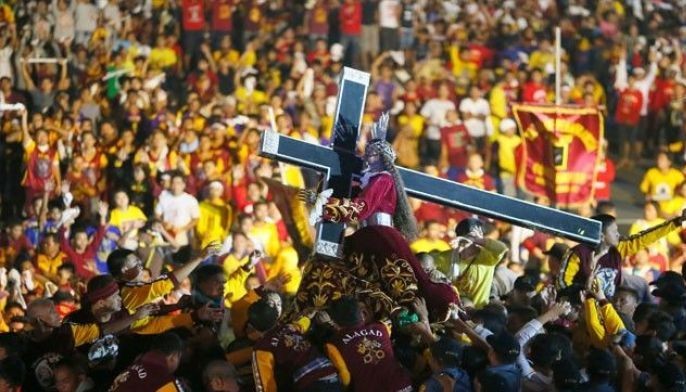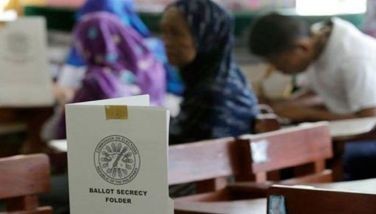Phl, US renew mutual logistics support accord
MANILA, Philippines - The Philippines and United States renewed their mutual logistics support agreement in Australia to further enhance interoperability, readiness and effectiveness of both military forces in dealing collaboratively with future challenges in the region.
The event was the highlight of last Tuesday’s 15th Pacific Commanders Chiefs of Defense Conference – a gathering of top military officials from 26 nations – held in Sydney.
Aside from the Philippines, New Zealand also signed the same type of agreement with the US.
“AFP chief Gen. Jessie Dellosa and United States Asia-Pacific Command (USPACOM) commander Admiral Samuel Locklear III shook hands after signing the agreement,” the American Forces Press Service said.
The signed Phl-US Mutual Logistic Support Agreement, which was patterned after the 2002 and 2007 agreement between the two allied states, calls for increased logistics cooperation in accordance with the RP-US Mutual Defense Treaty and the RP-US Visiting Forces Agreement.
The new agreement focuses more on reciprocal provisions of logistic support, supplies, and services between the military forces.
As part of its programmed troop withdrawal from Afghanistan, the US is planning a forward deployment of supplies and logistics from Kabul to the Philippines and Singapore instead of bringing them home.
Items that are not eligible for transfer under the new Phl-US agreement include: weapons systems; major end items of equipment except for the lease or loan of general purpose vehicles and other non-lethal items of military equipment which are not designated as significant military equipment on the US Munition List; and initial quantities of major items of organizational equipment covered in tables of allowances and distribution, tables of organization and equipment and equivalent documents.
Among the military items that are also excluded from being transferred from the US to other state as per US laws and regulations are guided missiles, naval mines and torpedoes, nuclear ammunition and items such as warheads, warhead sections, projectiles, demolition munitions and training ammunition, cartridge and air crew escape propulsion system (AEPS components), chaff and chaff dispensers, guidance kits for bombs and other ammunition, chemical ammunition (other than riot-control agents) and sources, byproducts, or special nuclear materials, or any material, article, data, or thing of value the transfer subject to the Atomic Energy Act of 1954.
Also stipulated under the Phl-US agreement are the exchanges or transfer of food, water, petroleum, oils, lubricants, clothing, ammunition, spare parts and components; support services to include billeting, transportation (including airlift), communication services; medical services, operations support and construction and use of temporary structures incidents operations support; training services, repair and maintenance services, calibration services, storage services and port services, during an approved activity.
On the other hand, storage units and ports shall at all times remain under the control and supervision of the Philippine government, the provision of the agreement said.
It also specifically declared that no US military base, facility, or permanent structure shall be constructed, established, or be allowed in the Philippines.
The Department of National Defense (DND) said port visits of troops from the US would continue despite the alleged dumping of toxic wastes in Subic by a contractor of the US Navy.
Defense department spokesman Peter Galvez said the supposed dumping of hazardous wastes and the goodwill visits of US military personnel are separate issues.
“The visits (of US soldiers) can continue without doing any kind of waste disposal,” Galvez said.
“US dumping is a separate issue to be addressed by the parties, SBMA (Subic Bay Metropolitan Authority) and the contractor,” he added.
Galvez said the concerned state agencies are now looking into the toxic waste issue, the latest controversy to hound the Visiting Forces Agreement (VFA) between the US and the Philippines.
“The VFA has necessary legal mechanisms in addressing issues. Pending investigation, those are two separate issues. There is no need to connect them,” the defense official said.
“That’s still under investigation. We are still looking into it what is happening there are claims of such activity,” he added.
Lawmakers also wanted to investigate the reported dumping of toxic waste in Subic.
Sen. Loren Legarda, chair of the Senate Committee on Foreign Relations, wanted immediate action done on the supposed move by the US Navy contractor to dump toxic waste in Subic.
Legarda also slammed the Malaysian firm that owns Glenn Defense Marine Asia, which services American ships in the Philippines, for invoking the VFA as defense in the dumping of hazardous waste in Philippine waters.
“The VFA is a framework for promoting the common security interests of the Philippines and the United States of America (which is through) strengthening our bilateral defense partnership,” the senator noted.
“It is not a treaty we have entered into with the United States so that their contractors can wantonly violate the country’s environmental laws,” said Legarda, co-chair of the Legislative Oversight Committee on the VFA (LOVFA).
Sen. Francis Escudero is also seeking a congressional inquiry over the issue.
“The government should investigate this alarming report immediately. Such activity, if indeed it took place, could prove to be an environmental disaster,” Escudero said.
“If it’s proven that Glen Defense Marine Asia had indeed dumped hazardous wastes on Subic Bay, they should immediately be made to dispose of the wastes properly as mandated by our environmental laws and international ecological standards and pay for all damages,” he added. Escudero also wanted the Department of Foreign Affairs to make representations to prevent similar incidents in the future.
Glen Defense Marine Asia earlier claimed through its lawyers that the SBMA had no jurisdiction to investigate them as they invoked the VFA.
Escudero, however, argued that laws are clear on environmental protection, particularly Republic Act 9275 or the Philippine Clean Water Act of 2004 if indeed hazardous wastes were dumped on Subic Bay.
Bayan Muna Rep. Teddy Casiño urged the House of Representatives to look into the issue.
“There should be a comprehensive congressional inquiry into this report. Who knows, this may not be the first time oil and human wastes were unloaded in waters off Subic,” he said.
Casiño said lawmakers should also find out whether the US Navy toxic cargo included nuclear wastes.
Casiño also called on the SBMA to suspend the operations of Glenn Defense Marine Asia, as he denounced the Malaysian firm for its “arrogant tone” in responding to the SBMA.
“While they are dumping toxic wastes in Subic waters, they say they are not accountable to Subic authorities. Glenn Defense Marine Asia is using the VFA as a cover for its wrongdoing. This is the height of impunity,” he said.
The group Kalikasan-People’s Network for the Environment (PNE) said charges should be filed against Glenn Defense Marine Asia for dumping toxic waste in Subic.
“The owners and operators of tanker MT Glenn Guardian deliberately and recklessly dumped their toxic waste in our waters. This shows not only their disregard to the integrity of our environment and the health of our people but this is also an affront to our national sovereignty,” said Clemente Bautista, spokesperson for Kalikasan-PNE.
“The case of Glenn Defense Marine Asia is a clear example of how the so-called visits of US military warships endanger us all. It is as if Subic Bay, and the whole of the country is once again in a large military base where the US military can have their ships travel and operate wherever they want,” Bautista said.
– Christina Mendez, Jess Diaz, Rhodina Villanueva
- Latest
- Trending
































